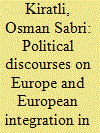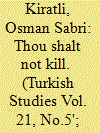| Srl | Item |
| 1 |
ID:
147968


|
|
|
|
|
| Summary/Abstract |
Through a textual analysis of national election manifestos, this paper critically discusses political parties' discourses towards Europe and European integration in three European Union (EU) member states: Germany, which has always promoted further integration; the United Kingdom, which has consistently been a keen supporter of intergovernmentalism; and finally the Netherlands, one of the original six and a willing, yet cautious, supporter of supranational cooperation. By analysing how political parties frame European integration in their discourses, we aim to investigate the variance in national political cultures with respect to identity and self-identification with Europe as a determining factor of support for the process. This paper concludes that although European integration is structured around a framework of interests in all the six party discourses under analysis, the construction of national identities and hence the articulation of national interest in EU membership as well as the visions for the political structure of the union varies significantly.
|
|
|
|
|
|
|
|
|
|
|
|
|
|
|
|
| 2 |
ID:
175518


|
|
|
|
|
| Summary/Abstract |
Through an original survey experiment on a nationally representative sample of the Turkish population, this article demonstrates that respondents who are primed on the immorality of the use of force against others are substantially more willing to support only conditional military intervention in a civil war in another country. Further statistical analyses reveal that the activation of moral beliefs largely depends on the degree of approval of the moral statement and previously held foreign policy predispositions on isolationism. These findings contribute to the research on priming and public opinion regarding the use of force in general and, in particular, interventions in civil wars.
|
|
|
|
|
|
|
|
|
|
|
|
|
|
|
|
| 3 |
ID:
159334


|
|
|
|
|
| Summary/Abstract |
This paper investigates the main determinants of Turkish public opinion on the use and utility of military force. Regression analyses based on survey data from a nationally representative sample demonstrate that socioeconomic and attitudinal factors perform better than demographic attributes in predicting individual support for the use of force. Accordingly, a high school degree, trust in the UN, and financial satisfaction have positive and significant association with isolationist foreign policy attitudes, whereas national pride, trust in the army, satisfaction with the government’s foreign policy performance and self-placement on the political right exert a positive effect toward militant foreign policy dispositions. The analyses also reveal considerable variation in individual attitudes between the supporters of the Adalet ve Kalkınma Partisi and Milliyetçi Hareket Partisi on the one hand, and the Cumhuriyet Halk Partisi and Halkların Demokratik Partisi on the other hand.
|
|
|
|
|
|
|
|
|
|
|
|
|
|
|
|